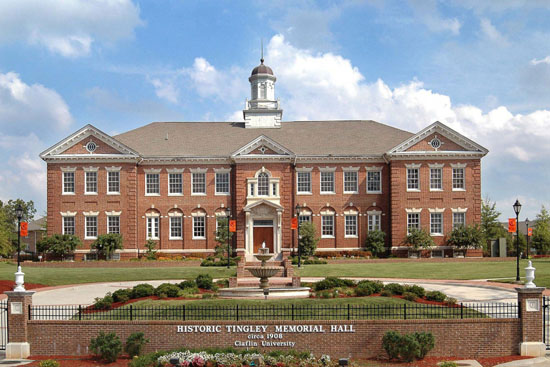Discovering a Southern Relative: Claflin University
Linking very different schools that share founder and mission

Boston University recently located a long-lost sibling in South Carolina.
While reading up on his University history, Tom Fiedler, dean of the College of Communication, discovered that BU shares a founder with Claflin University, one of the country’s oldest colleges to educate black students. “Both were chartered in 1869 by former Massachusetts governor William Claflin,” says Fiedler (COM’71). “And both charters forbade discrimination on the basis of race, religion, or gender.”
“I called a woman from Claflin’s communications department,” he continues. “She didn’t know about the connection either, but we both agreed it needed to be explored.”
Among contemporary similarities: both schools have sacred music programs and Claflin’s communications program mirrors BU’s.
The parallel led Fiedler to suggest an exchange program. Officials from each school conferred and concurred: next fall, BU and Claflin students will have the opportunity to cross paths, and cross the Mason-Dixon Line.
Nestled in Orangeburg, S.C., a small town between Charleston and Columbia, Claflin is far removed from its New England counterpart. The student body hovers at 1,800, and its traditions are Southern.
“There’s a real cultural opportunity here,” says Dean of Students Kenneth Elmore. “Claflin is steeped in African-American history, and its students played a huge part in the Civil Rights movement.”
Claflin was the first college in South Carolina to open its doors to African-American students, enraging proponents of Jim Crow, or “separate-but-equal,” laws.
“The state retaliated by literally building South Carolina State University around Claflin,” Elmore says. “It was as if they were trying to strangle it.” The schools remain separated to this day by an iron fence.
“Any BU student who takes part in this exchange will see a different world,” says Victor Coelho, associate provost for undergraduate education and a College of Fine Arts professor. “It will be particularly useful to students studying Southern literature, regional dialects, or cultural theology.”
Fiedler looks for an “eye-opening opportunity. The majority of our students are affluent, urban, and white. I expect they’ll experience some culture shock by spending a semester or a year at a small liberal arts college in the Deep South.”
In reverse, Elmore predicts that Claflin students could be overwhelmed by BU. “We don’t exactly have a traditional campus,” he says. “We’re grittier, noisier, and a lot bigger.”
Coelho expects the exchange program to be in place by fall semester. “We’re counting on three to five students participating from both schools,” he says.
He hopes international exchange students will take part. “Think of it as a two-for-one deal,” he says. “They get the best of both worlds by spending one semester in Boston and one in South Carolina.”
“The only remaining question,” Fiedler says, “is why did it take us so long to do this?”
Vicky Waltz can be reached at vwaltz@bu.edu; follow her on Twitter at @vickywaltz.
Comments & Discussion
Boston University moderates comments to facilitate an informed, substantive, civil conversation. Abusive, profane, self-promotional, misleading, incoherent or off-topic comments will be rejected. Moderators are staffed during regular business hours (EST) and can only accept comments written in English. Statistics or facts must include a citation or a link to the citation.